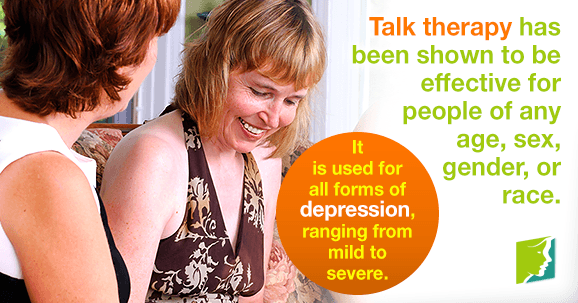Suffering from depression is becoming a very prevalent occurrence in the modern world, and there remains a certain stigma attached to the condition. This is often due to the fact that many people cannot, or do not, differentiate between feelings of occasional sadness and the continuing feelings of unhappiness and pain that are the hallmarks of depression. As a result of this misunderstanding, people with depression are often hesitant to discuss the problem. However, it has been shown that talk therapy is helpful for combating depression.
Changing the Way You Think
The way the therapy works is to alter how you think and feel about the issues in your life, thereby making them easier to deal with on a regular basis. The sessions allow a person to look at their life and problems from an alternative point of view and then a means to figure out the best actions to take to solve them.
People often underestimate the effectiveness of talking or being listened to, preferring to take tangible medication to treat a health problem. While some forms of depression do have a chemical imbalance element to them, most are influenced or directly related to outside stimuli. Therefore, while medications can be effective, actively examining and working through a person's thought process is sometimes more useful in the long term, as it results in a more permanent ability to deal with the problem.
Non-invasive Method
Unlike many medical treatments, talk therapy does not involve chemical alteration. Consequently, there is no risk of complications, side effects, or adverse reactions. Given that depression is common in older people, some of whom are often already taking medication for other health problems, using talk therapy instead of drugs that may interfere with their other prescriptions is a helpful solution.
All for One and One for All
Talking therapy has been shown to be effective for people of any age, sex, gender, or race. Educational background and economic situation are also irrelevant to the success rate of the therapy. It is also used for all forms of depression, ranging from mild to very severe, and can be used in conjunction with other medications or therapies. The reason for this is the fact that each session is tailored to suit the individual and their particular problems.
The therapist will often take some time to familiarize themselves with the patient's particular situation and then choose either cognitive behavioral therapy, problem solving therapy, or interpersonal therapy. All of these methods rely on the patient being cooperative and - crucially - honest about their issues. Patients also have to be aware that in order to change how they feel they have to embrace the contribution of the therapist.
Safe Space
One of the advantages of talking therapy is that it provides a safe, non-judgmental space for people to work through their issues. Patients can cry, scream, rant, or let their emotions out in any way they see fit as long as it is not harmful to the person they are talking with at the time. It is also a space which allows you time to think and, with the help of a trained therapist, can help to pinpoint the underlying issues responsible for the feelings of depression.
If you think you are suffering from depression, it is best to visit either a medical doctor or a trained psychiatrist to discuss the treatment options available. It should also be noted that if you are very uncomfortable talking to a stranger about your mental health, it can be useful to talk to anyone you do feel comfortable with, such as a friend or family member.
Sources
- Mental health foundation. (n.d). Talking Therapies. Retrieved January 26, 2015, from http://www.mentalhealth.org.uk/help-information/mental-health-a-z/t/talking-therapies/
- National Health Service UK. (2014). The benefits of talking therapy. Retrieved January 26, 2015, from http://www.nhs.uk/conditions/stress-anxiety-depression/pages/benefits-of-talking-therapy.aspx
- National Institute of Mental Health. (n.d). What Is Depression. Retrieved January 26, 2015, from http://www.nimh.nih.gov/health/topics/depression/index.shtml




